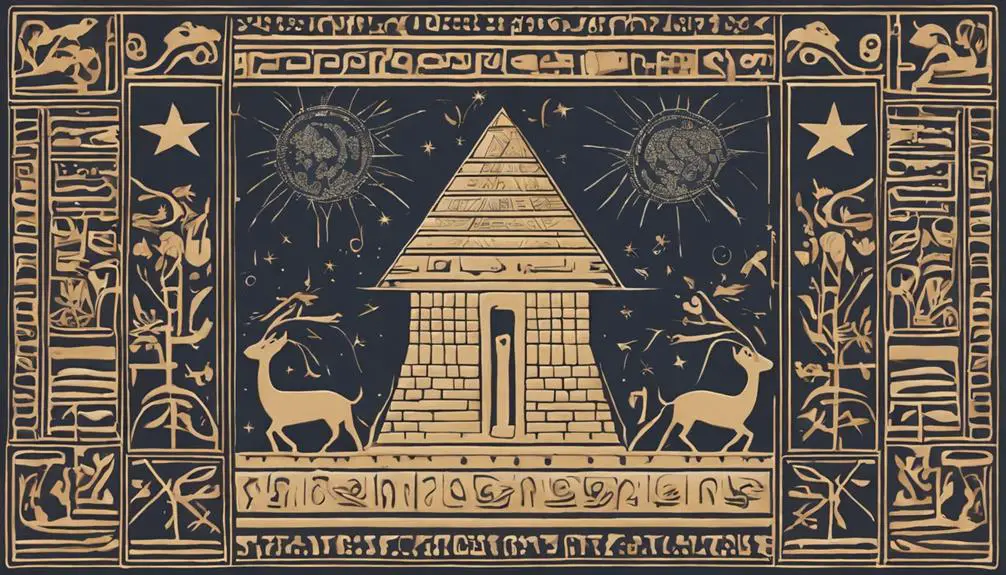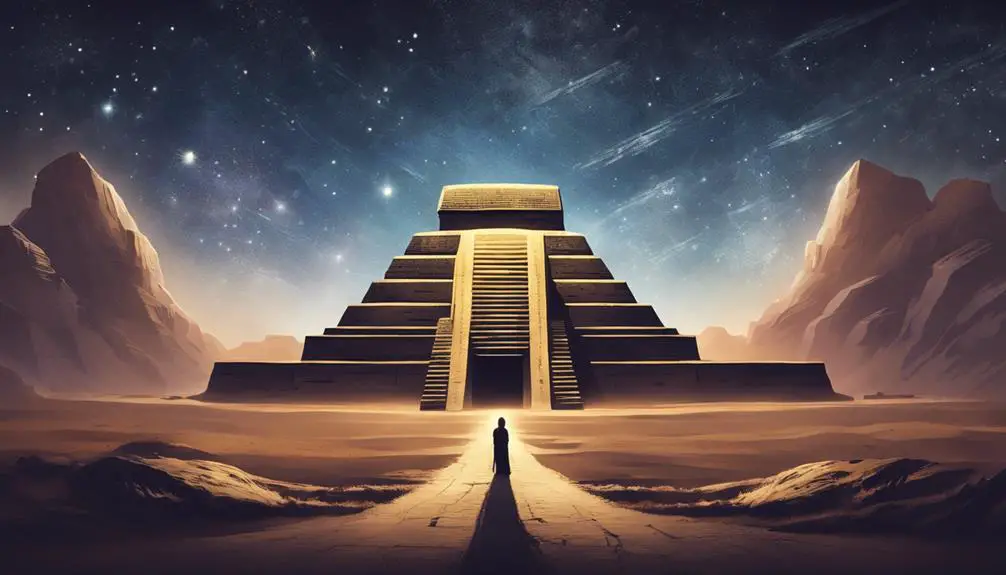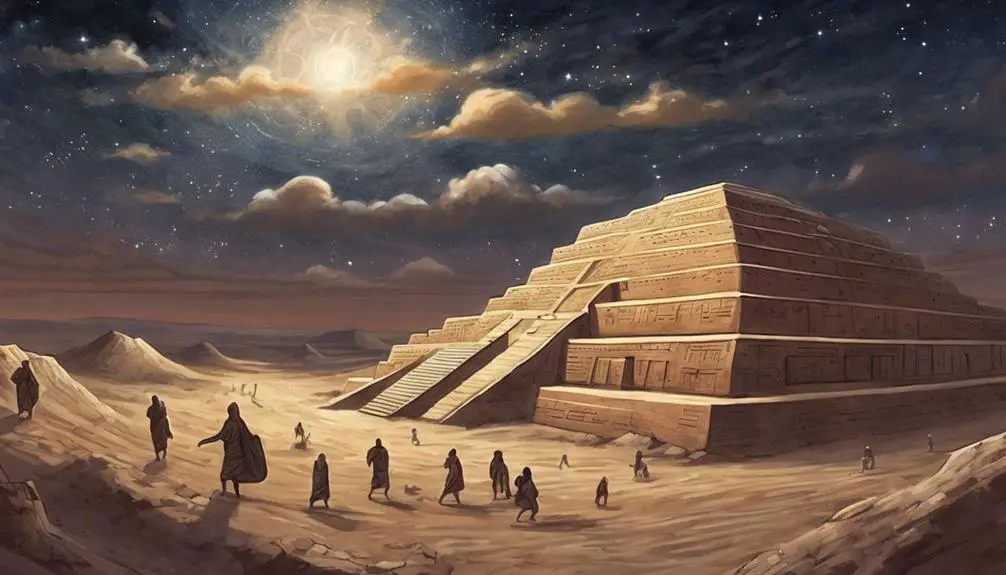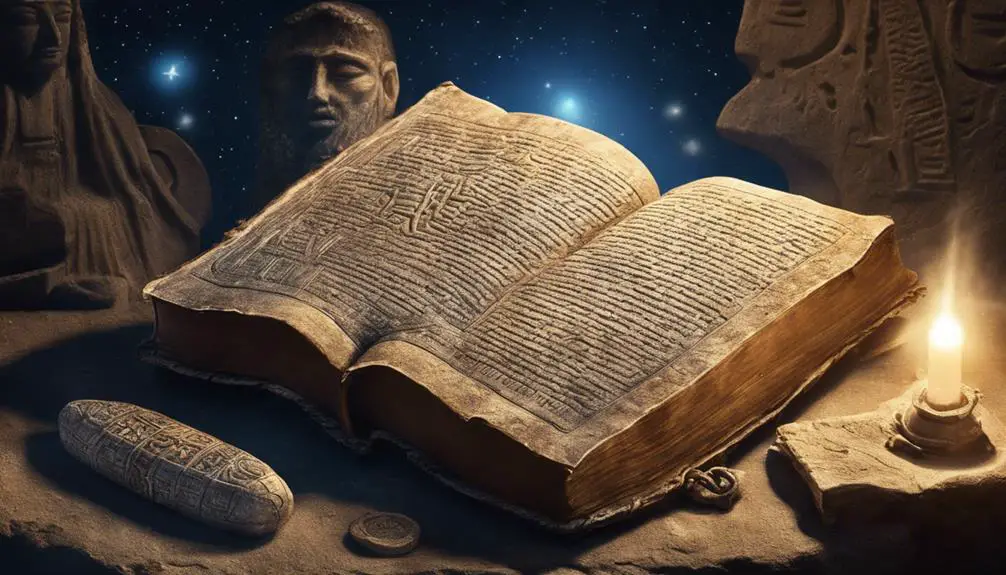Bridging ancient myths and biblical tales, the Anunnaki's presence in scripture ignites debate and curiosity, beckoning further exploration into our storied past.

Are the Anunnaki in the Bible
Imagine you're sifting through ancient texts, and you stumble upon descriptions of the Anunnaki, a group of deities from Sumerian mythology, which bear a striking resemblance to beings mentioned in the Bible.
This discovery raises a compelling question: Are the Anunnaki referenced, directly or indirectly, within the biblical texts? Scholars have debated this connection, with interpretations ranging from dismissive skepticism to enthusiastic endorsement.
As you consider the similarities between the ancient stories, you'll find yourself at the crossroads of myth and scripture, where the lines between historical fact and allegorical fiction blur.
This exploration not only challenges our understanding of ancient civilizations but also invites you to question the roots of mankind's most enduring stories.
Key Takeaways
- The Anunnaki's influence on biblical narratives is speculated due to parallels and references found within biblical texts.
- Scholarly evaluations often separate mythological aspects of the Anunnaki from theological messages in the Bible.
- Theories of ancient connections suggest historical exchanges may have introduced Anunnaki influences into biblical stories.
- There is no direct mention of the Anunnaki in the Bible, but their legacy may have shaped some biblical narratives indirectly.
Unveiling the Anunnaki

To understand the Anunnaki's role in ancient texts, it's crucial to examine their origins and how they've been interpreted over time. The Anunnaki, often associated with the Sumerian civilization, have sparked a wide range of modern interpretations, significantly influencing both scholarly discourse and popular culture. This examination offers insights into their perceived roles and the various ways these ancient figures have been understood across different periods.
Modern interpretations of the Anunnaki diverge significantly, ranging from them being seen as deities in ancient Mesopotamian religions to being considered extraterrestrial beings in some of the more speculative theories that have emerged in recent times. These interpretations reflect the evolving nature of human understanding and the cultural impact of ancient mythologies on contemporary thought. Scholars meticulously analyze ancient texts to decipher the true nature and influence of the Anunnaki, while others speculate on their possible connections to human origins and advancements in early civilizations.
The cultural impact of the Anunnaki can't be understated. Their story has been adapted into various media, from books to films, often depicted with a blend of ancient lore and modern imagination. This hasn't only popularized the Anunnaki but also sparked debates on the authenticity and significance of ancient texts. As you delve deeper into the subject, you'll find that the Anunnaki's legacy is a fascinating blend of history, mythology, and modern interpretation, reflecting humanity's enduring fascination with its ancient past.
Sumerian Myths Explored

Diving into Sumerian myths reveals a complex tapestry where the Anunnaki play pivotal roles, shaping not only the cosmology but also the societal structures of ancient Mesopotamia. These deities, central to Sumerian belief systems, are featured prominently in numerous epic tales, each offering insight into the mythological origins of the universe and humanity's place within it. The narratives surrounding the Anunnaki aren't merely religious texts; they're also foundational to understanding the worldview and cultural heritage of one of the world's earliest civilizations.
The emotional resonance of these ancient stories can be captured through the following aspects:
- The Creation of Mankind: The Anunnaki are said to have created humans from the earth itself, instilling a deep connection between humanity and the divine, as well as a sense of purpose and destiny.
- The Flood Story: A tale of destruction and renewal, where the compassion and wrath of the gods are displayed in full force, evoking a sense of awe and fear.
- The Quest for Immortality: These narratives often explore the human desire for eternal life, mirroring our own fears of mortality and the unknown.
- The Struggle for Power: The epic tales frequently depict battles between the gods, reflecting on themes of authority, rebellion, and the complexities of leadership.
Analyzing these mythological origins provides not only a window into the soul of ancient Sumerian society but also offers timeless reflections on human nature and the universe. The stories of the Anunnaki, rich with symbolic meaning, continue to fascinate and inspire, demonstrating the enduring power of myth to shape our understanding of the world.
Biblical Texts Examination

When examining biblical texts, it's essential to consider the intriguing parallels and references to the Anunnaki, shedding light on their potential influence and presence within this ancient and foundational body of literature. You must delve into ancient translations to uncover the layers of meaning that have been shaped by centuries of cultural influence, offering insights into how these texts have evolved over time.
The scrutiny of biblical passages requires a deep understanding of the historical and cultural contexts in which they were written. Ancient translations aren't just about converting words from one language to another; they involve interpreting the nuances and subtleties of cultural expressions. This process is complicated by the fact that the cultural influence of neighboring civilizations, such as the Sumerians, has left its mark on these texts.
You'll find that the Anunnaki, a key element of Sumerian mythology, may have influenced certain biblical narratives, albeit indirectly. However, it's crucial to approach this analysis with an objective lens, separating the mythological aspects from the theological messages.
Exploring the biblical texts through the lens of ancient translations and cultural influence not only enriches your understanding of these sacred writings but also opens up a dialogue between the past and present. It's a reminder of the interconnectedness of human cultures and the shared heritage that shapes our collective consciousness.
Theories of Ancient Connections

Exploring the theories of ancient connections, it's crucial to understand how the Anunnaki may have left an indelible mark on biblical narratives through the lens of historical and cultural exchanges. When you delve into the annals of ancient history and mythology, the presence of the Anunnaki provides a compelling lens through which to examine the intersection of divine beings and humanity. This intersection has sparked a fascinating debate about the role of ancient astronauts and the extraterrestrial hypothesis in shaping human civilization and religious texts.
- Ancient Astronauts Theory: This theory suggests that extraterrestrial beings, referred to as the Anunnaki in Sumerian mythology, visited Earth in the ancient past, influencing the development of human civilizations. The emotional weight of considering our ancestors might've interacted with beings from another world challenges our understanding of history and our place in the cosmos.
- Technological Advancements: The hypothesis posits that these ancient astronauts provided advanced technological knowledge that led to sudden leaps in human progress. This notion evokes a sense of wonder and speculation about the origins of our technological achievements.
- Cultural and Religious Influences: It's argued that the Anunnaki inspired many of the narratives found in ancient texts, including the Bible. The thought that our spiritual beliefs could be intertwined with extraterrestrial encounters brings a profound sense of intrigue and reevaluation of our religious foundations.
- Linguistic and Genetic Imprints: The theory extends to suggest that the Anunnaki's influence is evident in human languages and genetic makeup. This assertion stirs a deep curiosity about the essence of our identity and the potential for extraterrestrial ancestry.
Analyzing these theories from an analytical and scholarly perspective, it's important to sift through the evidence and assess the plausibility of the ancient astronauts and extraterrestrial hypothesis in explaining the Anunnaki's purported connections to biblical narratives.
Scholarly Interpretations Reviewed

Turning our attention to scholarly interpretations, it's crucial you understand how academics critically evaluate the evidence surrounding the Anunnaki and their supposed influence on biblical narratives. Scholars approach this topic with a rigorous methodology, seeking to separate fact from fiction and to clarify modern misconceptions. They delve into ancient texts, archaeological findings, and the broader context of Near Eastern cultures to assess claims of direct links between the Anunnaki—deities from Sumerian mythology—and biblical figures or stories.
One key aspect of scholarly analysis is the examination of cultural influences. Experts in the field scrutinize the transmission of myths and religious beliefs across neighboring civilizations, such as the Babylonians, Assyrians, and the Israelites. This approach helps to identify shared motifs and themes that might suggest a common cultural heritage or influence, rather than direct borrowing or representation.
Furthermore, scholars are keen to highlight the dangers of oversimplification. The leap from recognizing similarities between Sumerian deities and biblical narratives to declaring direct Anunnaki presence in the Bible often ignores the complex interplay of cultural, historical, and linguistic factors that shaped ancient texts. Academics urge caution, advocating for a nuanced understanding that respects the integrity of each tradition.
In their quest to debunk modern misconceptions, scholars employ a comparative analysis, contrasting the original Sumerian texts with biblical scriptures. This meticulous comparison often reveals that while there are thematic overlaps—such as flood myths or divine assemblies—the specifics differ significantly, underscoring the importance of context in interpreting ancient texts.
Frequently Asked Questions
How Do Modern Religious Leaders Interpret the Potential References to the Anunnaki in the Bible?
You'll find that modern religious leaders approach potential references to the Anunnaki with theological skepticism, prioritizing scriptural accuracy. They often analyze ancient texts critically, separating myth from what they consider divine revelation.
This analytical, scholarly stance means they're cautious about linking biblical figures or stories directly with the Anunnaki, reflecting a broader hesitation to intertwine unverified historical claims with established religious teachings. Their focus remains on interpretations aligned with traditional theological frameworks.
Have There Been Any Recent Archaeological Discoveries That Significantly Alter Our Understanding of the Anunnaki's Influence on Early Biblical Figures?
You may find it intriguing that no recent archaeological discoveries have significantly altered our understanding of the Anunnaki's influence on early biblical figures.
While artifacts continue to spark scholarly debates, the authenticity and interpretations of these findings remain contentious.
It's crucial to approach these discussions with a critical mindset, as the evidence doesn't conclusively support a drastic change in our perception of ancient narratives or their impact on biblical stories.
How Do UFO and Extraterrestrial Enthusiasts Correlate the Anunnaki With Ancient Astronaut Theories, Especially in Relation to Biblical Narratives?
You're diving into how UFO and extraterrestrial enthusiasts link the Anunnaki with ancient astronaut theories. They often lean on Sumerian texts, highlighting descriptions of beings from the sky, to bolster alien theories tied to biblical stories.
Are There Any Cultural or Religious Groups Today That Worship or Venerate the Anunnaki as Deities Directly Linked to the Stories Found in the Bible?
You're diving into whether any groups today worship the Anunnaki, linking them to biblical narratives without the immediate context of their presence in the Bible. It's intriguing to see how Anunnaki origins and worship practices have evolved.
While some modern spiritual movements might venerate them as ancient deities, directly connecting them to biblical stories isn't widespread. Your exploration taps into a niche yet fascinating aspect of contemporary religious practices.
How Has Popular Media (Films, Books, TV Shows) Influenced the Public's Perception of the Anunnaki's Connection to Biblical Events and Characters?
You've likely noticed how films, books, and TV shows have twisted the Anunnaki mythology, blending it with biblical narratives. This media exaggeration fuels wild theories, linking these ancient deities directly to biblical events and figures. Analytically speaking, this trend has significantly skewed public perception, making it hard to separate historical facts from fiction.
The scholarly view gets overshadowed, leaving many to navigate a maze of misconceptions about the Anunnaki's true historical context.
Conclusion
In your exploration of ancient texts and myths, you've delved into the enigmatic realm of the Anunnaki from Sumerian lore and scrutinized their potential echoes in Biblical narratives. Through scholarly lenses, you've navigated theories intertwining these ancient civilizations, stirring curiosity and wonder.
Yet, the definitive link remains shrouded in mystery, leaving you at the threshold of an age-old enigma. As you stand on the precipice of history and myth, the truth about the Anunnaki's presence in the Bible tantalizingly hovers just beyond reach, inviting further inquiry and contemplation.



Sign up